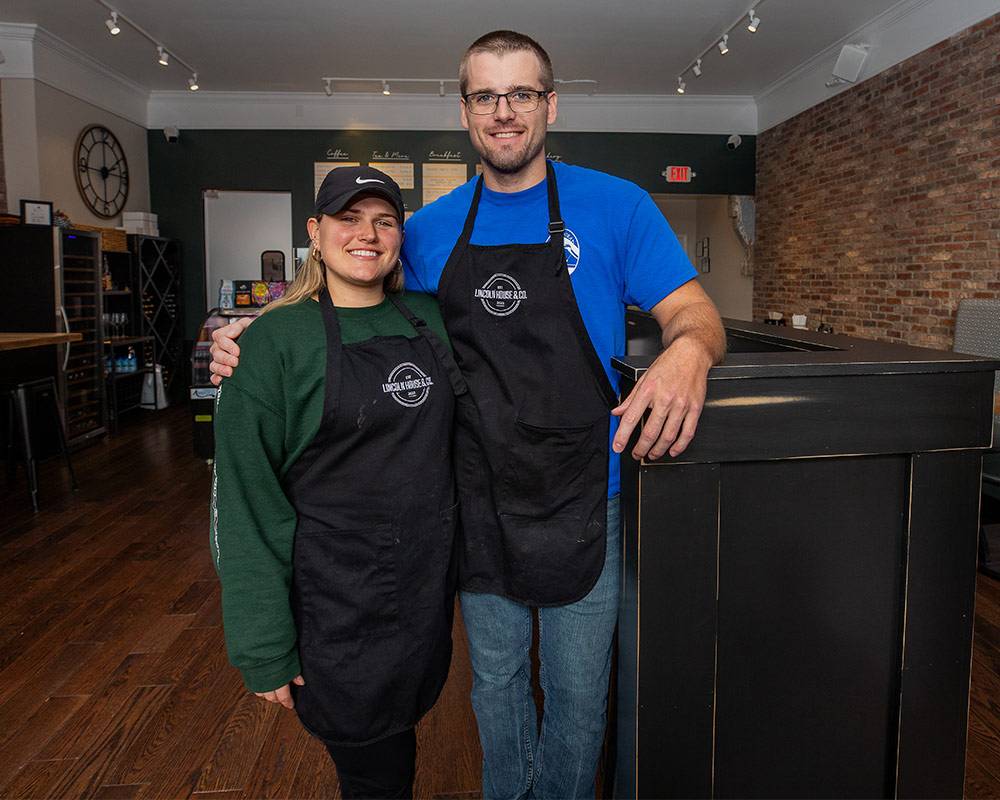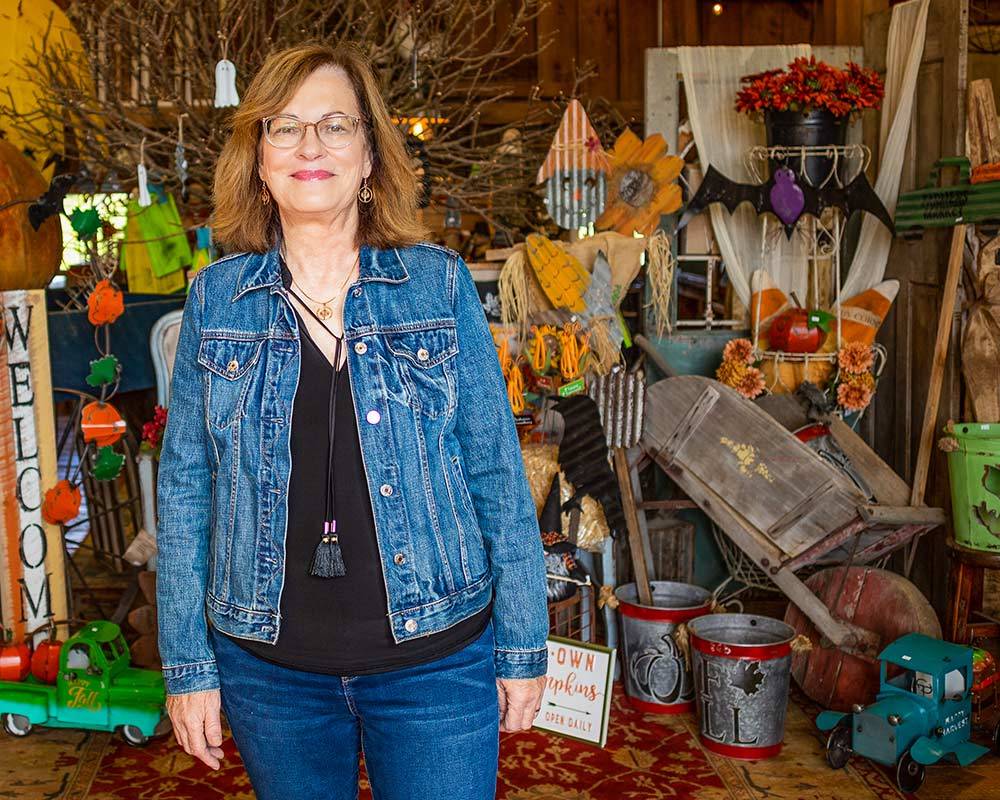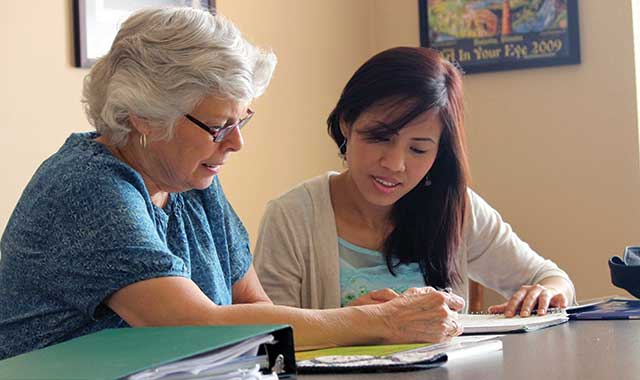Our region’s shifting demographics is creating an ever-larger demand for English-language education. Meet a St. Charles-based group that’s making a difference through one-on-one tutoring.

Marty Janners had been looking for something to occupy her time since retiring five years ago, after a long career as a college administrator and professor. About a year ago, a member of her church approached her about volunteer opportunities with Literacy Volunteers Fox Valley (LVFV), a St. Charles-based organization that provides free, one-on-one tutoring in reading, writing, speaking and understanding English.
Janners began tutoring Kay Thi Win, from Burma, who spent 10 years in a refugee camp. Kay, who’s married and works nights at a factory to support her family, needed to improve her English skills. She and Janners immediately hit it off, so much so that Kay postponed receiving her American citizenship so Janners could attend.
“Kay is so brave,” says Janners. “She works hard and is willing to do whatever she needs to do to make life better for her and her family. I’m impressed with how this program helps people like Kay.”
With hundreds of students and tutors in St. Charles, Geneva, Batavia, Elburn and rural Kane County, LVFV is helping others to learn to communicate better. Many students speak English as a second language, coming from foreign countries such as Brazil, Bulgaria, Burma, China, Columbia, France and Italy. As they learn English through tutoring, they develop a connection to the language that they can’t get in a traditional class.
“What makes this a unique program is the one-on-one tutoring,” says Jane Cooper, a board member. “If a student is in a traditional class, for example, and they’re sick and can’t attend, they may fall behind and be unable to catch up. The lessons in our program are catered to their timing, needs and situation. If they can’t attend, the lesson picks up where they left off. We offer flexibility.”
Growing Possibilities
LVFV served 311 students last year, and is on pace for similar numbers this year. In fact, there’s a waiting list of almost 40 students. Many are referred by family, friends or places of employment, and stay with the program for two years. All are age 21 and over.
“We’ve been growing every single year,” says Peg Coker, executive director. “There is a large number of people coming to our area with limited language skills and education. In St. Charles alone, the Latino population has grown by 5 to 10 percent. There has been a growth in the Asian population as well. There is definitely growth and need.”
There’s no cost to students, as the organization is funded by grants and donations. The largest grant comes from a Secretary of State literacy grant awarded by the Illinois State Library. Others come from Chicago Tribune Charities, a McCormick Foundation Fund committed to improving the lives of disadvantaged Chicago-area children and families, and United Way agencies. The organization’s largest fundraiser is the Trivia Bee for Literacy, which raised $21,000 last year.
LVFV is accredited by ProLiteracy, the largest nongovernmental organization of adult basic education and literacy programs in the world. Only 400 of the 1,200 ProLiteracy affiliates have achieved this designation, and LVFV was re-accredited in 2010.
Tutors don’t have to be teachers or even have a college degree. They’re trained by LVFV staff to work with students. The time commitment is one hour a week for the lesson, and some additional time to prepare for the lesson. Tutors and students meet mornings, afternoons or evenings, and always at a public place, usually at the St. Charles, Batavia or Geneva public libraries.
Last year, 208 volunteers took part in an LVFV volunteer training session, before being paired with a student. Tutors also have the option of taking on additional students, if their schedule allows. Some volunteers have tutored for more than 20 years. “We want our tutors to stay with us for as long as they want,” says Coker, who’s been with LVFV herself for 23 years.
Filling a Need
Board member Jane Cooper, president of Cooper Hong Inc., a public relations and marketing firm, has served on the LVFV board for four years. Her husband, Daniel Hong, is from Taiwan, and struggled with English when he moved to the United States.
“I recognized that challenge,” says Cooper, who tutored English as a foreign language when she lived in Taiwan for four years. “I’ve been on the other side. I can remember going to stores and struggling to find laundry detergent, because the labels were in Chinese, and I couldn’t talk with anyone. Until you can communicate, you’re hindered from becoming part of the community in a meaningful way. If you can communicate, you have access to so much more and excel where others can’t, whether it’s literacy or fluency.”
The LVFV started in 1986, thanks to Norm Huntley, at the time president of St. Charles Public Library Board of Trustees. “He saw statistics that scared him,” Coker says. “There were many people in the area who couldn’t read. As a library trustee, he thought everyone should be able to read.”
The program started with five students who spoke English as a second language and five tutors. “At the time, smaller businesses were opening that employed adults who needed help learning English as a second language,” Coker says.
The organization has celebrated significant accomplishments over the years. In 1989, LVFV was asked to tutor incarcerated youth at the St. Charles Youth Center. The program was the forerunner of JumpStart, a literacy program for young inmates now administered by Literacy Volunteers Illinois. A year later, LVFV started a workplace literacy program at Pheasant Run Resort in St. Charles.
LVFV also has established literacy programs at many local companies, including ARAMARK, Arthur Andersen, Houghton Mifflin Harcourt, McDonald’s, Atlanta Bread Co., Burgess-Norton Manufacturing Co., CartonCraft, Pyramid Manufacturing, Norton McMurray Manufacturing Co., R.R. Donnelley and Recora Inc.
“Usually businesses come to us,” says Coker. “If their employees learn general English, it’s going to help them to communicate better and more effectively. It helps the employees and the companies grow. It’s a win-win situation.”
In 2004, LVFV set up on-site tutoring in the community room of Batavia Apartments, a Franciscan Ministries low-income housing complex. The program brings one-to-one learning to isolated residents who lack transportation as well as English language skills.
Three years ago, LVFV and St. Charles School District #303 brought small-group learning to the parents of immigrant children at Richmond Intermediate School. That program has since expanded to Thompson Middle and Davis Primary schools.
“It’s wonderful to see parents involved in the school community,” Coker says. “They want to read material their children bring home from school, and they want to be able to participate in parent-teacher conferences. We teach them what they need to know.”
As technology advances, tutors are also teaching students the importance of social media. “We’ve had more students who might not necessarily speak English, but want to text because they have mobile phones instead of landlines,” Coker says.
St. Charles resident Coker previously worked for the American Medical Association in Chicago. She found the commute difficult, so she quit to stay home and care for her child; eventually, she decided to volunteer for LVFV. During the training session, the coordinator told her they were looking for a new executive director. Coker applied and was hired before she ever became a volunteer.
“I’ve always been drawn toward literacy,” she says. “It’s so satisfying to see people grow, not only in their English language skills, but for them to become comfortable to the point where they give back to the community. It’s a wonderful job.”
Empowering Tutors
The organization’s staff of four includes two tutor trainers, a program manager and Coker. The board of directors includes 10 community volunteers, who pitch in to help in a variety of ways, as well as set policy and guide strategic planning.
“They’re people who represent all the communities we serve – men and women, diverse people with different business backgrounds,” says Coker. “I have the best board. They bring in all of their resources and ideas. They become so excited as they brainstorm ways we can take a kernel of an idea and grow it into a new program. We’re always looking for ways to improve our effectiveness and support the tutors.”
The tutors learn a framework that allows for various learning techniques, as they teach reading, writing and vocabulary development. Beginning students work on simple greetings, such as ‘Hello,’ or ‘How are you?,’ reading street signs, and writing their name, address and phone number.
“The best tutors are patient and willing to listen and give practical advice,” Coker says. “It’s your life experience that’s the most important thing. Many students, for example, are caring for elderly. A person with a nursing background would be a wonderful match. We have retired engineers working with factory employees. We have parents working with other parents who want to better understand the school district. Our students have limited vocabulary and take many words to express themselves. People aren’t very patient in general, and want people to speak quickly. Our students can’t do that – they don’t have the depth of vocabulary. That element of patience is so important. Our tutors are more than teachers. They’re mentors and connectors.”
Tutor Janners recently took on a second student, a woman from Iraq. “I was surprised by the need for literacy help in this area,” she says. “Being retired, I missed the interaction I had with my students. It feels good to be able to work with young people again.
“This is a worthy program that I would recommend to anyone who is looking to make a difference in our community. I’m so glad I became involved.”




















































